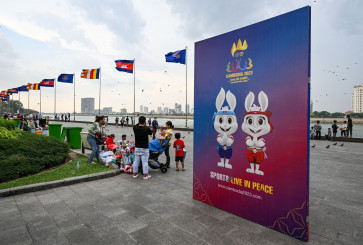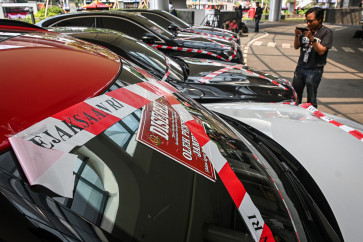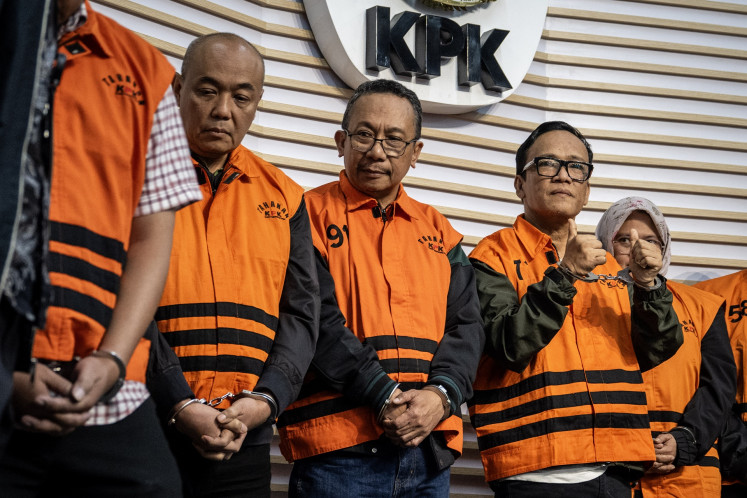Popular Reads
Top Results
Can't find what you're looking for?
View all search resultsPopular Reads
Top Results
Can't find what you're looking for?
View all search resultsFreida Lee Mock: The worlds of the outcasts
Courtesy of Freida Lee MockShe is an Academy Award-and Emmy Award-winning filmmaker, director, writer and producer of feature length and short form documentary films
Change text size
Gift Premium Articles
to Anyone
Courtesy of Freida Lee Mock
She is an Academy Award-and Emmy Award-winning filmmaker, director, writer and producer of feature length and short form documentary films.
In fact, Freida herself equates the documentary maker's journey to Dorothy's adventure down the yellow brick road.
Her latest documentary project, G-dog, however, follows a darker yellow brick road into the gritty, frightening reality of downtown LA, where a veritable wizard, Jesuit priest Father Greg Boyle, known to his 'homeboys' as G-dog, is running the world's largest, most successful gang rehabilitation center.
Her documentary follows Father Boyle and his team for one year as Homeboy Industries in LA tackles mounting financial problems and gang reprisals against his rehabilitated homeboys.
At the heart of great documentary making, according to Freida, is a good story and even greater characters.
G-dog, the main focus of the story, certainly fits the bill.
'I had no idea he was so funny, I thought his life story was interesting, but that makes [the storytelling] all that much easier,' Freida says.
She is in Jakarta as a part of the American Film Showcase (AFS) program, where screenings of American documentaries as well as workshops, discussions and master classes are being held for budding filmmakers and the general public alike.
The AFS ' which runs from Feb. 3 until March 31, where 36 award-winning feature films and independent documentaries are shown across Java, Kalimantan and Sumatra ' hopes to engage Indonesian audiences with unique views of contemporary American society, and inspire and assist young filmmakers in Indonesia to tell their own unique stories.
While the workshops and discussions will relate to the filmmaking process, the discussions also hope to highlight social issues such as female empowerment, youth empowerment and diversity and civil society.
She said that her initial attraction to the story began with the apparent opposition of its key elements: violent gang culture, a Jesuit priest and unconditional love.
'I came across a brief description of a new book Tattoos on the Heart ['¦] I remember saying to myself, 'A priest, kids, gangs'¦and love? What's this all about?' And so began G-dog,' she said.
G-Dog's compassion is a constant thread that interlaces the story of how thousands of Latino, Asian and African American ex-gang member's lives have been changed by this rehab and intervention program.
'What I thought would be a story about how a Jesuit priest became a gang expert developed into a more complex, rich story about former gang members, abandonment, neglect and shame but also about second chances, redemption, hope, transformation and community ' all embodied in the program Father G launched at Homeboy Industries,' she said.
Homeboy Industries has had a 70-percent success rate in redirecting kids away from gang life and
has revolutionized the school of thought on gang rehabilitation worldwide.
Freida's foray into nonfiction documentary making began almost 10 years ago with her Oscar-winning documentary Maya Lin: A Strong Clear Vision (1994). Some of her other well known films include Return with Honor (1998) and Wrestling with Angels: Playwright Tony Kushner (2006).
For Freida, the decision to begin a career in nonfiction documentary films was a light-bulb moment.
'I was curious about how the world works, and that's why I studied history. I think what I do now as a filmmaker includes that big picture idea, whatever the story might be ' there's always that sense of trying to understand how it all works,' she said.
At the heart of documentary making is a good story and convincing characters, according to Freida, but it's also vital to research the area before beginning filming.
'Every story you engage in opens a world, I find it's very important for me to understand the big picture before you start to film. I like to read secondary stories, sometimes primary stories just to get that understanding,' she said.
_______________
For AFS screening schedule in 11 cities, visit jakarta.usembassy.gov










